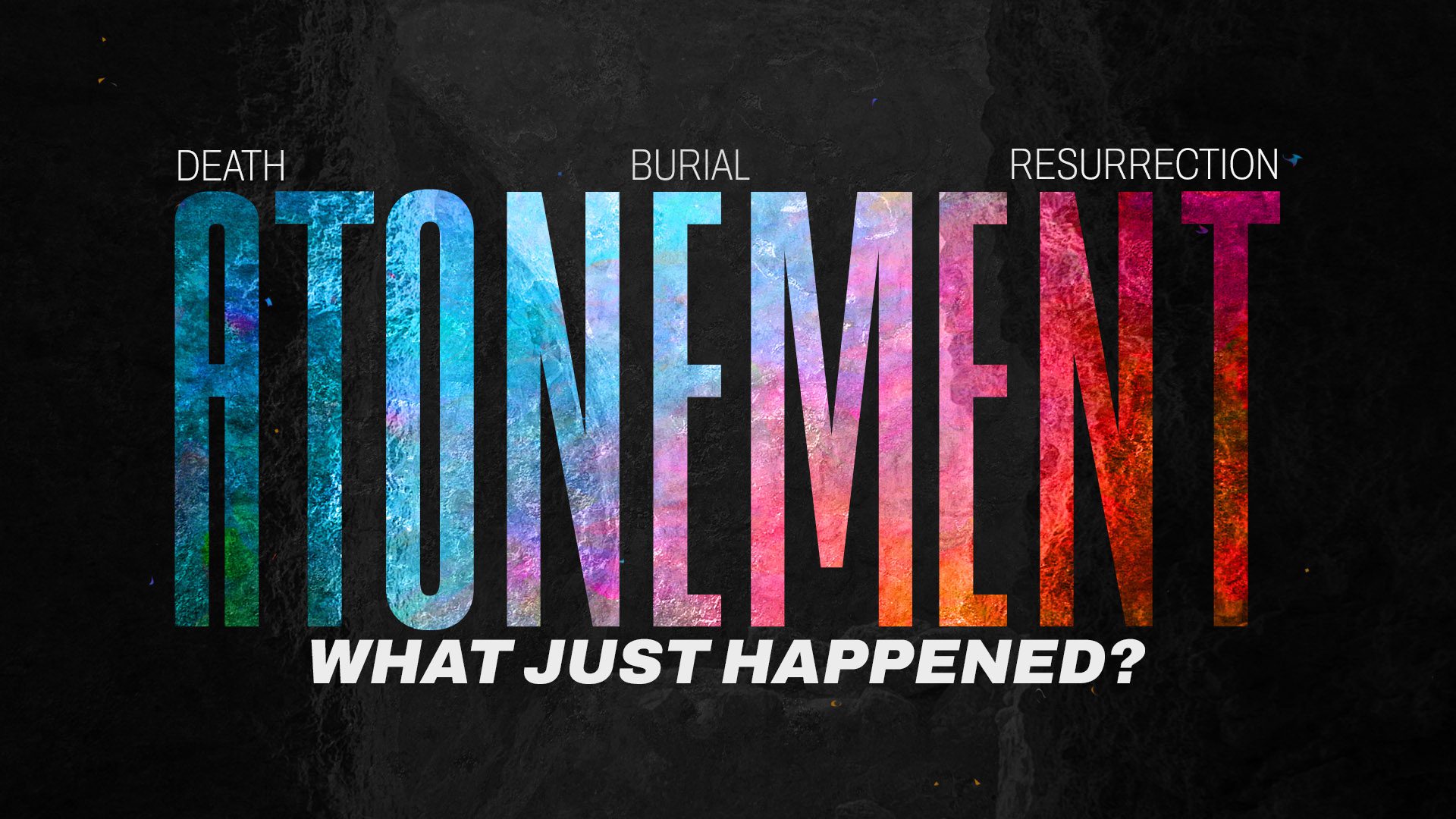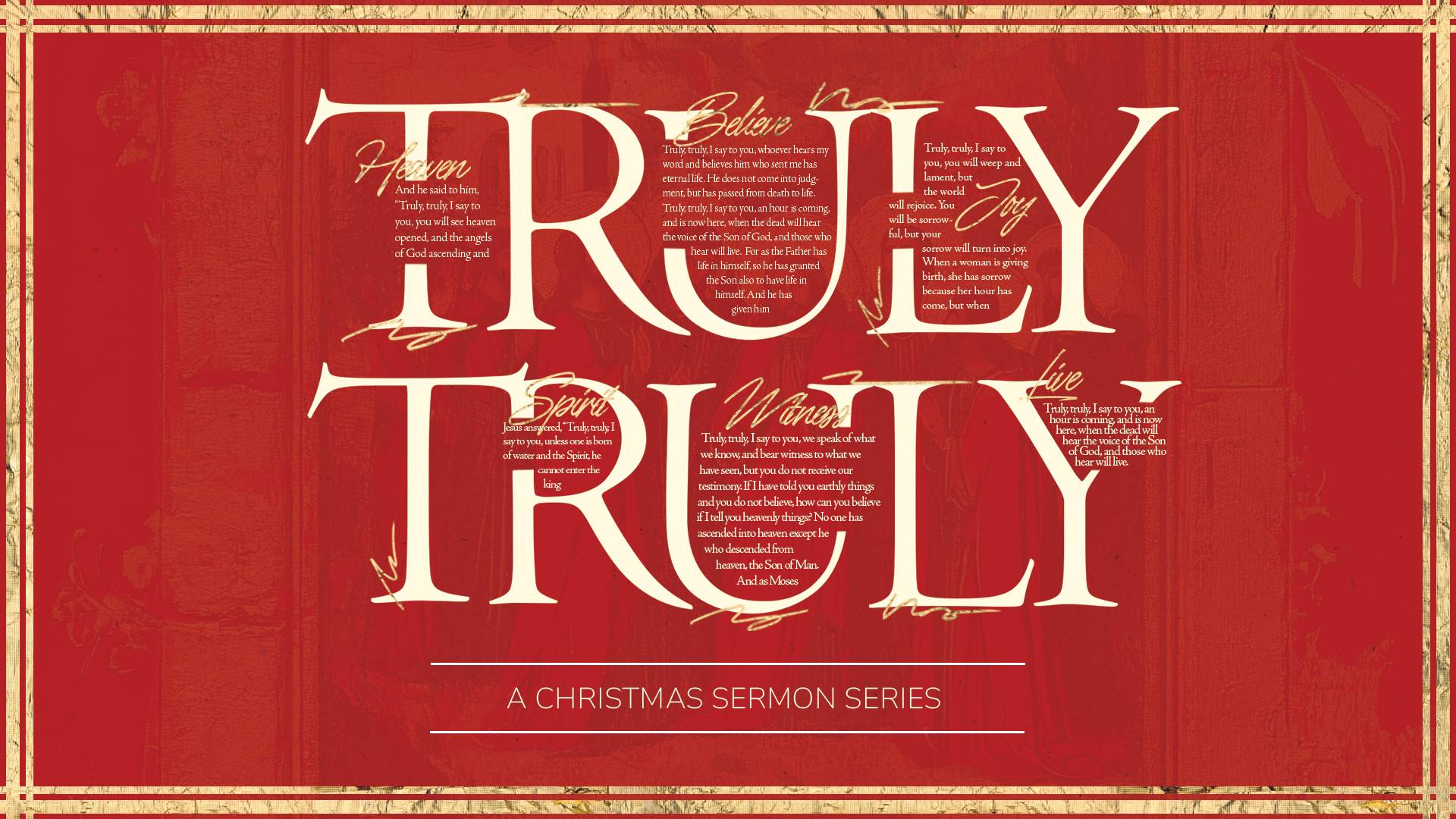Redemption
Romans 6 (ESV)
May 1, 2022
Pastor Josh Beakley
1 What shall we say then? Are we to continue in sin that grace may abound? 2 By no means! How can we who died to sin still live in it? 3 Do you not know that all of us who have been baptized into Christ Jesus were baptized into his death? 4 We were buried therefore with him by baptism into death, in order that, just as Christ was raised from the dead by the glory of the Father, we too might walk in newness of life.
5 For if we have been united with him in a death like his, we shall certainly be united with him in a resurrection like his. 6 We know that our old self was crucified with him in order that the body of sin might be brought to nothing, so that we would no longer be enslaved to sin. 7 For one who has died has been set free from sin. 8 Now if we have died with Christ, we believe that we will also live with him. 9 We know that Christ, being raised from the dead, will never die again; death no longer has dominion over him. 10 For the death he died he died to sin, once for all, but the life he lives he lives to God. 11 So you also must consider yourselves dead to sin and alive to God in Christ Jesus.
12 Let not sin therefore reign in your mortal body, to make you obey its passions. 13 Do not present your members to sin as instruments for unrighteousness, but present yourselves to God as those who have been brought from death to life, and your members to God as instruments for righteousness. 14 For sin will have no dominion over you, since you are not under law but under grace.
15 What then? Are we to sin because we are not under law but under grace? By no means! 16 Do you not know that if you present yourselves to anyone as obedient slaves, you are slaves of the one whom you obey, either of sin, which leads to death, or of obedience, which leads to righteousness? 17 But thanks be to God, that you who were once slaves of sin have become obedient from the heart to the standard of teaching to which you were committed, 18 and, having been set free from sin, have become slaves of righteousness. 19 I am speaking in human terms, because of your natural limitations. For just as you once presented your members as slaves to impurity and to lawlessness leading to more lawlessness, so now present your members as slaves to righteousness leading to sanctification.
20 For when you were slaves of sin, you were free in regard to righteousness. 21 But what fruit were you getting at that time from the things of which you are now ashamed? For the end of those things is death. 22 But now that you have been set free from sin and have become slaves of God, the fruit you get leads to sanctification and its end, eternal life. 23 For the wages of sin is death, but the free gift of God is eternal life in Christ Jesus our Lord.
He was a man who once lived without any fear of God. He knew about the Bible. As an only child, there was no escaping his mother’s lessons about Scripture, about prayer, and about God. It didn’t mean he liked it. At age 7, his mother died of tuberculosis. So with the little religion that he had stomached from her to that point, he just completely renounced it. His care was transferred to his father, who was a merchant navy captain. He took him on six voyages, beginning at age 11.
He was actually fired from his first job due to “unsettled behavior and impatience of restraint.” He had a rebellious spirit that even the royal navy could not tame. He tried to desert, but he was caught, cuffed, and flogged. Even that didn’t purge his insubordination. He just got worse. He had this free-thinking style, fleshly desires that helped him actually manipulate his superiors into discharging him to a ship of degenerates to just seek his dreams of moral abandon. He went on to work as a mate and a captain on numerous other vessels, profiting off of one thing; the trade of slaves. He was rude, prideful, and immoral. He had a mouth of profanity that made other traders blush. By his own admission, he had intentionally sinned with a high hand and made it his study to tempt and seduce others. When it came to the idea of God, he was a man without fear. He was relentless in the pursuit of his own immoral freedom and he was reckless in his disregard for the freedom of others.
But one day, his ship entered a storm and that tempest was so severe that he thought he might perish. Thoughts of death began to surface and he remembered some verses from the Bible spoken of by his mother so many years ago. These were words that alarmed him and reminded him and woke this man, John Newton, into a healthy fear of God. It was a fear that would, by the grace of God, drive him to a faith and trust in Jesus, to follow Him and then leave the slave trade, disgusted by it, eventually joining in the effort to abolish it. Eventually, at the age of thirty-nine, he began this ministry of over forty years, preaching the good news about the grace of Jesus.
He lived to be eighty-two and would amaze his friends. At that point he said, “My memory is nearly gone, but I remember two things. I am a great sinner and Christ is a great Savior.” As a minister of a small congregation, he would write hymns for the people to sing that were filled with precious truths. He called himself the African blasphemer, yet he would marvel at this message of grace. From that wonder came one of the best known songs that our nation would sing, often without understanding what is truly being spoken.
Amazing grace! How sweet the sound,
That saved a wretch; like me!
I once was lost, but now am found,
Was blind but now I see.
Grace is so amazing that it’s shocking! It’s almost a scandal. It’s a concept we often overlook. We forget the shock of such undeserved favor and kindness that is poured out through Jesus upon sinners who actually deserve wrath. Sometimes we sugarcoat sin and the devastation that is all around us. But when we’re actually confronted with it and then experience that grace has been given, it’s a scandal. But the Scriptures are filled with characters, real people, sinners who did not deserve this grace and yet were rescued by God. Paul was one. He was a persecutor of the church. He would come into an assembly and he sought to break up families and put them in prison. He was opposed to this message of grace. In his own words, in 1 Timothy chapter 1, he said that he was
1 Timothy 1:13 though formerly I was a blasphemer, persecutor, and insolent opponent.
But he says this.
1 Timothy 1:14-15 and the grace of our Lord overflowed for me with the faith and love that are in Christ Jesus. This saying is trustworthy and deserving of full acceptance, that Christ Jesus came into the world to save sinners, of whom I am the foremost.
We heard that verse quoted. Paul says
1 Timothy 1:16 But I received mercy for this reason, that in me, as the foremost, Jesus Christ might display his perfect patience as an example to those who were to believe in him for eternal life.
He’s saying, “God wants to put me on display as a trophy of grace.” That is scandalous! It’s grace that is amazing! He wrote about this grace often. It was the opposite of what the religious leaders of the day had taught. They taught that favor with God was something that you earned. It was something that you achieved through doing what was right. It was acquired through following the rules and honoring the law. It was salvation by good works, by the righteousness of your own doing. You work your way in there.
This message of grace was offensive. It was a righteousness that Paul had depended on himself. It was a righteousness of his own. When he encountered this message of grace he opposed it, yet one day he experienced an encounter with the risen Jesus and discovered otherwise. There was no place to stand before a holy God. There was only one way that he could be rescued and experience favor, and that was by God’s grace through faith in Christ. It’s God’s righteousness on our behalf, trusting in what just happened. Jesus came and died in our place. Christ died for our sins just as God promised. He was buried and rose, offering life to all who trust in Him. That is the good news, the message Paul proclaimed. He called it the Gospel, which is the power of God to salvation to everyone who believes. He wanted to proclaim this message around the world and even to this church at Rome. This is scandalous grace worth trusting.
It’s a grace that is not always so easy to accept. Can this really be true? How does grace like this bring God glory without the rules and the law? Is that really going to work? I mean, isn’t that kind of grace going to actually encourage people to become even worse sinners? Does it just give freedom and inspire them to go do worse? How can this grace work? How can it bring God glory? That’s part of what Paul addresses here in Romans chapter 6.
It’s a very important lesson. I’ll summarize it like this. A grace-dominated Gospel produces a grace-dominated people. A Gospel, a message that is permeated, that is saturated, that is dominated under the influence of grace is not going to result in people who are permeated, influenced and dominated by sin. It’s going to produce people who are likewise dominated, influenced, permeated by grace. This message of grace may actually prompt some to expect that sin’s influence will be on the rise. But our lives should leave no doubt that the opposite is true. The message of grace should be so dominating our Gospel proclamation that it may even prompt some to wonder if sin is going to get worse. But how we live and the way that it shows in our lives should so dominate us that the accusations and charges of such a thing would not be able to stand. This message that is so controlled by grace is actually going to give way to a people controlled by grace. That’s what Paul is going to unpack here.
You might say how is that possible? It doesn’t quite make sense. So Paul is going to give some clarification. He knows we need this. We have questions about this message of Gospel grace. So He gives a few clarifications. We’ll try to touch on three about this grace. So first, we’ll look at what this grace teaches. Or maybe specifically, what it does not teach. We’ll call this
The Heresy We Renounce: Our Supposed License To Sin (6:1-2a)
Heresy just means a wrong teaching, a wrong idea, a wrong understanding. It’s something that we reject or renounce. We say no, that’s not true. That heresy, that misunderstanding is that grace gives us license to sin. It’s that this grace that Paul is teaching is actually an encouragement and permission and an authoritative inspiration to go and sin more. That’s not true and we reject that because God rejects that. Paul clarifies for us that this is not what grace teaches. Grace does not teach us to glorify God by reveling in sin. That’s not what it teaches. We renounce that. There have been a lot of people throughout history who have promoted that teaching and it surfaces time and time again. It’s alive and at work in various places all throughout the world and even in our own midst. There are times when people would start to fall into this idea that grace is license to sin.
There was a Russian monk who had influence in some leadership positions there. He distorted and perverted this view of God’s grace. He taught that you need to experience God’s grace by sinning intentionally and then repenting and do it more and then it shows God’s grace more. He recruited a number of followers who followed him into great immorality and abuse of substances because he taught this particular heresy. It was an abuse of grace. He would say without sin there is no repentance, so we must move forward and sin. This is a terrifying example of the opposite of what grace truly teaches. We renounce that outright.
This is not something God didn’t anticipate and correct at the very beginning here. Paul is explaining the Gospel to this church at Rome and he knew this would be a question that would arise in the minds of his readers. He gives this clarification about this heretical supposed license to sin that some might accuse grace of teaching. So in verses 1 and 2, you see his clarification. He begins with two questions and an exclamation.
1 What shall we say then? Are we to continue in sin that grace may abound? 2 By no means!
You see the first question, why it surfaces here. Paul exposes the doctrinal confusion that lurks underneath this heresy. He asks
1 What shall we say then?
What shall we say then in response to everything you’ve been talking about in this doctrine of the Gospel? In chapter 5 Paul says
Romans 5:20 Now the law came in to increase the trespass, but where sin increased, grace abounded all the more,
What are you saying, Paul? What should we say about this? I’m struggling to understand what you’re trying to communicate. In fact, I think you might be saying something that seems pretty alarming. This whole idea of grace seems dangerous, in fact. Paul uses this teaching style of question and response to help people understand what he is trying to communicate.
This whole book reminds us of the hard work we have to do with doctrine. We have to explain, “this is what I’m saying” and also sometimes, “this is not what I’m saying.” Some of our very fast-paced communication culture has lost the strength and integrity of having those kinds of conversations with people, where we understand both what they’re saying and what they’re not saying. There is humility and the hard work of actually wrestling with truth. When we come to Jesus and we come to the Scriptures, there is a call to some hard work of wrestling with questions and answers. What is he not saying? What is he saying? The stakes are high. So Paul raises this question himself. It’s a question that would kind of arise because of doctrinal confusion. What are you saying, Paul? Here is the disturbing concern that this confusion might lead to. He says
Are we to continue in sin that grace may abound?
Is this what you’re saying? Are you saying that we should sin more so that God would be even more gracious? Are we to continue in sin that grace may abound? If great sin requires great grace to God’s glory, then maybe grace is teaching to keep sinning to increase grace. This takes Paul’s celebration of grace and perverts it into an abuse of grace. It’s the very heresy that others have taught and lived to great destruction.
I believe it was the French teacher Voltaire who said, “God will forgive. That’s His business.” That’s His business. That’s what He does. He’ll forgive. You just keep on sinning and God will forgive. That’s His business. Another man said it like this. “I like committing crimes. God likes forgiving them. Really, the world is admirably arranged. I like this setup. I like to do bad. God likes to forgive. We’ll just keep moving in that relationship.”
That’s the disturbing concern that arises out of this doctrinal confusion. Teaching grace seems dangerous because teaching grace seems like asking for or encouraging sin. So that’s how the heresy surfaces and it is expressed. But here’s how it’s addressed. Look at the decisive correction that Paul issued against this heresy. He says
2 By no means!
There is an exclamation point there. There is not punctuation in the Greek, but the exclamation point is rightly put there because it’s the strongest and clearest way that you can renounce something. You see it sometimes in English like “Never! Perish the thought! Away with the notion! May it never be!” It’s this idea of, no way! Paul has already used this word three times in chapter 3. He’ll use this phrase another six times as sort of an exclamation of horror and outrage at this perversion of grace. It’s like saying, “I will have none of that!” It’s kind of funny because Paul is the one who asked the question. He’s like, “Hey, are we to do this? I’m glad you asked. Never!” Whoa!
Paul is making a clear point. He says that grace teaches us not that we’re free to revel in sin, but we’re free from the rule of sin. You see, grace teaches us that sin is not to be reveled in, but it’s actually to be repented from. Grace is actually a beautiful teaching. It might seem dangerous. It might seem like asking for sin, but grace actually is good news for sinners because it’s bad news for sin. You see, grace is a friend of sinners, but it’s an enemy of sin. A grace-dominated message is actually going to produce a grace-dominated people.
You see this at work in Jesus, when He would come and the religious leaders of the day had great concerns about Jesus. “This man seems dangerous.” It almost seemed scandalous. It seemed like He would be an encourager of sin, perhaps. Jesus brought good news for sinners, but in one sense, you could say He brought bad news for sin. Because when He encountered sinners, it was as if the light shown into the darkness and their eyes were opened and they said, “I don’t want anything to do with this anymore.” There was a radical power at work through the grace of God. Whether it was the woman at the well or Zacchaeus, as Jesus encountered sinners and tax collectors, it did not welcome and encourage more sin. Grace permeated their lives such that they wanted to live differently and they wanted more of that grace of God. They lost their appetite in some ways. The same way that sin was ruling over them, they said “No, Jesus is the true king and ruler. I want His rule in my life.” There is a danger of misunderstanding grace, that it encourages an intentional, willful sinning as an established pattern of life. It’s that it sets one free to that kind of pursuit.
Peter was an apostle who experienced much grace. He denied the Lord in His moment of great need. He understood what betrayal looked like, and he received grace. Yet he also understood that grace was not a license to sin. He said
1 Peter 2:16 Live as people who are free, not using your freedom as a cover-up for evil, but living as servants of God.
He said
2 Peter 2:19 They promise them freedom, but they themselves are slaves of corruption. For whatever overcomes a person, to that he is enslaved.
There is a false sort of freedom, a false sort of grace, a whisper that you can be free to sin and go and do this. Paul says no, actually, that is a perversion. That is a twist. That’s a corruption. It’s not a true freedom. It’s actually a bondage. If you look at the world, you can see the world offering this kind of path. The world will say to do what you want. Follow whatever you feel or follow your heart and your desires and this will give you true freedom. Yet, we know and often parents are seeing it with their own kids, but we sometimes lack that kind of understanding for ourselves. But we watch and we say no, that will lead to bondage. It’s being peddled as freedom, but it’s slavery of the worst kind. That actually comes into the church. Jude would say
Jude 4 For certain people have crept in unnoticed who long ago were designated for this condemnation, ungodly people, who pervert the grace of our God into sensuality and deny our only Master and Lord, Jesus Christ.
They say grace actually frees us for sensuality and to serve this master of sin. He says, no, grace and freedom is about a new master. Freedom is not freedom from service. You have to serve, but it’s freedom to service of the one who is loving, the one who gives life, not death. Grace and holiness actually go together. This is the work of God in a life. Like light shining into the darkness, the darkness cannot stand. Grace shines and floods into a life. A message dominated by grace, as people grab hold of that by faith, the power of the Holy Spirit will also produce a life dominated by grace. It might be so much that you could be falsely accused. You trust in the grace so much that people say, “Are you saying that it’s okay to sin?” If people don’t actually wonder that at times or question that, then maybe we’re not doing it correctly. We’re not being clear enough. Grace is wonderful and forgiving. But as much as people might wonder if that charge is true of us, our lives will give no testimony, no ground for that charge to stick.
So the sobering question for us is, are we living in such a way that people might actually believe that’s the Gospel message? Are we living in such a way that people say, “I understand the Gospel. It gives you license to sin.” They should hear our words and wonder if that’s true. They should look at our lives and know it’s nothing of the sort. That’s what grace does. It’s a wonderful, precious gift. Praise God for the grace at work in our church family. I see it. I know it. There are people longing to say, no, I don’t want to live in license to sin. I want to pursue the grace of God. That’s what I have received. I want to do that. I renounce this heresy. I see the danger. So we ask how does this happen? How does that kind of grace, as we renounce it, how does it happen? How does it work in our life? Well, this is
The Mystery We Embrace: Our Union With Christ (6:2b-3)
We’re moving from the supposed license to sin, to what is truly there. That is our union with Christ. This is how grace works. It’s a union that joins us with Jesus. The union that is often described in marriage is a picture. It’s two people joining their lives in one. It’s a mystery that couples often use rituals and symbols to try to describe. So they take two sand jars and pour them into one. They become one. Or they take a rope and tie strands together. Or they fasten their hands together. They take two candles and they try to light the one candle to show that two become one. Sometimes you’re at those weddings and the candles just won’t light that single candle and you wonder, is this a sign? (Laughter!) But it’s ultimately not about the candles or about any of these symbols because they’re just trying to show the mystery of the beauty of what they believe actually is happening. They’ve been united. There is a oneness. This mystery is what Paul says happened to Jesus, where we’re one with Christ. We need to embrace the realities of this mystery. The first is what it implies. Grace joins us with Christ in a way that forever redefines our relationship with sin. So look at what this mystery means. He says
How can we who died to sin still live in it?
We died to sin. How can we still live in it? We now have a relationship with sin that is redefined. Because of Christ, he says now we have died to sin. We’ve joined ourselves to Jesus through faith and the rule of sin has ended. Its rule, its dominion has ended so decisively that you could say that we’re dead to it. It no longer has the power, authority, or dominance in our lives. It’s not in charge.
We talk sometimes about how the grace of God has rescued us in Jesus from the penalty of sin. So we don’t fear the judgment of God. We talk sometimes about how one day we’ll be rescued from the presence of sin. There won’t be any sin in heaven and we don’t have to worry about it. But right now, we understand that in a very real sense, He has rescued us from the power of sin. So while there may still be a remaining presence of sin and it may resurface, we are not under its power. We’re not under its rule. It is not our master or Lord. We have a new Master and a new Lord. We have Christ. Our relationship with sin and with Jesus has been redefined.
If that’s the case, he says, how can we live otherwise? That’s happened. How can we entertain a lifestyle of sin or wallow in habitual disobedience. How can we surrender ourselves to the ongoing tyranny and rule of sin after its power has been so decisively broken? It’s not saying that sin won’t remain and resurface. He’s going to describe that later on. He just says it makes no sense for sin to rule. Being united in Christ as a Christian to continue in resolute unrepentant sin doesn’t make sense. It’s incompatible. It’s unbiblical. Here’s how the apostle John would say it.
1 John 3:9 No one born of God makes a practice of sinning, for God’s seed abides in him; and he cannot keep on sinning, because he has been born of God.
How can we who died to sin still live in it?
Grace joins us with Christ in a way that forever redefines our relationship with sin. To drive that point home, he is going to spend much of the chapter just explaining how that happens, the reality expressed in this mystery. He is going to do so by writing to these believers in Rome that he hasn’t met, to reference something that they would be familiar with, how Christians should be, drawing on this experience and teaching of baptism. He’s going to use that as a way to explain this spiritual reality, this mysterious union with Christ. Grace joins us with Christ through baptism into His death. He believes it should be clear. He says
3 Do you not know
This should be understood. It’s clear. He has used that word “know” in verses 3, 6, 9 and 16. There is knowledge of understanding this is important. It should be clear and it’s comprehensive. This is true of all that all who have been united with Christ have been joined with Christ. A true Christian enjoys this reality and that what is true here and true of us all is a connection here
that all of us who have been baptized into Christ Jesus were baptized into his death?
It’s not just a nice pretty picture. No, there is a connection between being baptized into Christ and into His death. This is what grace does.
We ask what kind of baptism is Paul talking about, here? It’s not easy to be perfectly nuanced, but the main point we don’t want to miss. I think we can get into the idea here that baptism as a simple word means immerse or dip. The early Christians did that and submerged one another as followers of Jesus because it’s what Jesus taught. So that’s what they would do. But that picture of baptism was given to demonstrate an inward spiritual reality. Actually, what God would accomplish when He rescues us from the realm of darkness is that we’re baptized in the Holy Spirit. So the baptism is a picture of what has happened. It usually takes place at the beginning of a believer’s life. It’s this outward sign or picture of that mysterious inward reality that has already taken place by the grace of God. Paul talks about that baptism of the Spirit elsewhere.
There are some who teach that the baptism of the Holy Spirit is something that happens after you have been converted. Later on, that there is this future baptism by which you are filled with the Holy Spirit in a unique way that empowers you to live a uniquely holy life. I don’t think that’s what Paul is teaching, here. While being under the control or the influence of the Spirit, being filled with the Spirit is a part of the regular Christian life, I think Paul here is referring to the baptism that happens that God accomplishes by the grace of God. We’re reminded of this mysterious union with Christ by the symbolic act of water baptism. It’s something accomplished on the cross, yet experienced at conversion, but ultimately, it’s truly understood in those two simple words, in Christ. There is something mysterious about it. Along with that in Christ, there is a union or belonging or identifying with someone. You can see that in 1 Corinthians chapter 10. Paul talks about the fathers of the Old Testament. He says
1 Corinthians 10:1-2 For I do not want you to be unaware, brothers, that our fathers were all under the cloud, and all passed through the sea, and all were baptized into Moses in the cloud and in the sea,
He’s not talking about the baptism that we understand in the New Testament. No, this is the idea of being identified with or associated with Moses. Paul is saying we’re baptized, and you could say we’re baptized into Jesus’ Name. That would maybe align with Matthew 28. But I think it’s slightly more accurate to say we’re baptized into union with Christ. We’re identified with Him. In Galatians, Paul says
Galatians 3:27 For as many of you as were baptized into Christ have put on Christ.
So there is this union, this beauty. So when Paul says we’re baptized in relation to His death, that we’re united or joined by the Holy Spirit in relation to His death. When Jesus spoke, actually in Luke, He said
Luke 12:50 I have a baptism to be baptized with, and how great is my distress until it is accomplished!
This idea of baptism had this impending distress. It was His death that was to come. That symbolism isn’t lost. Paul understands what is happening in both a literal and a figurative way. There is association with Christ and with His death. This is what the Holy Spirit accomplishes. Not only did Christ die for us, but in a sense, we died with Him. That’s the same verse that we heard just previously
2 Corinthians 5:17 Therefore, if anyone is in Christ, he is a new creation. The old has passed away; behold, the new has come.
So it’s just simply boiled down to those two words, being in Christ. We’re no longer described by that old life, governed by relationship with Adam. But now we are in Christ. We have a new relationship. So sin no longer has the rule or power or authority over us as master. That relationship has been redefined. This grace that dominates this message dominates us as a people. So we can’t experience real relationship with Jesus and leave unchanged. We’re now in this unique way, mysteriously baptized, united with Christ in His death such that we have died to sin. This is a mystery that we embrace. We cannot live as if sin is in charge, as if it rules. Look at where this grace leads.
The Liberty We Exercise: Our Freedom To Serve (6:4-7)
We’ve died to sin, so now there is a freedom. There is a life that actually we want to live out because of this change of who is ruling over us. There is a freedom that we serve. There is a freedom to serve God. Grace delivers us from slavery. That’s that redemption. God delivers us from slavery to sin and then sets us free to serve God. Our culture has this misunderstanding about freedom, that we can do whatever we want without service to anyone. That’s just not true. We always are serving, it’s just who is the master? Are we serving sin or are we serving God? Sometimes we think we’re hesitating from serving God as if we cannot serve anyone. No, there isn’t a middle ground. We’re living under the rule or the dominion or service of sin.
Paul is clear in Romans that we’re all born under the law, under the rule of and bondage to sin and it has the influence or power over our lives. It takes different forms. It expresses itself outwardly in different degrees, but sin is the master. Paul’s point here is that Christians united with Christ by grace have a redefined relationship with sin and it’s not the ruler. The expression that shows is made obvious through repentance. It’s that we’re turning and trusting in Jesus, saying, “You’re my ruler. You’re my Lord.” It’s a change of mind that results in a change in course. Now I’m surrendering not to sin, but to God. Baptism is this picture of a decisive change that has taken place and the testimony is a reminder of real people in real ways. Sometimes we miss the beauty of the fact that God is the new ruler, here.
I think it was over ten years ago that there was a short-term trip that came from Bethany to South Africa. A number of people came and we ended up going up into Mozambique. As we’re there, there are people living in some pretty hard conditions. But we had some opportunity to share the Gospel. There are a number of people who said, we want to follow Jesus. We had been sharing the Gospel for a while and they said it’s time to get baptized. So we ended up having a little march, a little processional down to the river. There are crocodiles in the river, so it’s an act of courage. We’re walking down to the river and they’re singing. Do you know what they’re carrying with them? There are a bunch of witch doctors in the area and they are afraid and terrified of witch doctors and spirits and demons. So here they are. These witch doctors have given them all kinds of little bracelets and totems and books and things that they’re supposed to do to keep themselves safe. They’re living under the fear and the dominion and the rule of sin. There are acts of sin that they’re supposed to perform. Here they are and they’re saying this is not in charge anymore. They’re carrying these things. They come and they’re baptized and they put all that stuff in a pile. So here we are. Wow! They’re under another rule. We’re sitting in a circle and we’re praying around this thing. As we’re praying, it was like the Spirit of God like Boom! We all fell back. I thought, “Whoa! Is that the Spirit of God at work?” I opened my eyes and someone had dumped a whole thing of gasoline and lit it all on fire. (Laughter!) I thought my eyebrows were on fire. Well, I guess it was just fire.
But you say, wait a second! Was that not the Spirit of God? People living under the rule of sin and fear, they would say, “You’re not in charge anymore. Jesus is in charge. He’s my ruler. He’s my king.” Do you know what we did? We sang and we danced like people from Bethany have never danced before (Laughter!) and probably never will again. (Laughter!) But it was beautiful because it was a clear picture of Jesus is in charge and we’re living for His rule. There is a change. Do you think that there was no more sin? No. Sin remained. There are things that occurred, but there was a decisive recognition that we’re dead to sin and alive to Christ. He is our ruler. Grace now sets us free. It brings a blessing of life anew, life eternal, life unbound. We’re free to live differently.
4 We were buried therefore with him by baptism into death, in order that, just as Christ was raised from the dead by the glory of the Father, we too might walk in newness of life.
In the same way that Christ was raised from the dead by the glory of the Father, here now we have life anew and we live in that new realm, that new rule. We’re united with Jesus and we abide in Him. Now here, the union is pictured like Jesus described. It’s like a graft of one branch into another. He is the source, so we abide in Him, He says in John 15, just like a branch abides in that source vine and then God produces the life and the fruit through Him. Apart from Him we can do nothing. We live under His rule and His power. In a sense, we’re dead to sin. Paul says
7 For one who has died has been set free from sin.
Death is the decisive end. It settles all the claims. It was over ten years ago that my wife, Janea, lost her mom to cancer. Thankfully she was a follower of Jesus. We believe she is with the Lord, now. It’s a painful thing. On this side of heaven, we know it’s a deep loss. There are some things you can know from a distance. There are some things you only see up close. One thing she was talking to me about a while ago is the strange difficulty after her mom died and they give this death certificate. Then you submit that paperwork and you go through the system. But the city would keep mailing a jury summons for her mom to come to jury duty. So she would keep trying to send it in, but they would keep mailing that jury duty summons. Eventually, you know there is some kind of glitch in the system. You say she is not coming. You see, you don’t have to worry about it because whatever kind of consequences or whatever rule of law, her mom is not alive to that. It has no power, no dominion over her. She is alive to God. It’s decisively broken in its power.
Sin and its power is decisively broken. We live under the rule of Christ. Now in Christ we are a new creation so we live under that rule. That grace coming through the Gospel of Christ dominates our lives. It’s going to produce a grace-dominated people. Now, I’m not saying that sin’s presence is removed. That is one day future. Paul is going to talk about the wrestle and the battle of daily living that reality out, putting sin to death. But that reality that we’re called into is not something that happens in spite of grace. It happens through grace.
We don’t say license and libertinism and sinning a lot, the answer to that is more law and legalism. Or if you’re being really legalistic and kind of consumed with the law, then we need to just kind of sin more and be more open and free to sin. No. One pastor calls those two non-identical twins from the same womb. The answer to the one is not the other. Both are incurred by the light of grace. We run to Christ and the relationship that is offered to us in that we are justified, we’re reconciled, we’re redeemed and His power through the Holy Spirit is going to transform the way we live. Grace dominates our lives. We don’t need to fear grace.
You know the story about the pastor who talks about the boy who encounters some friends. It’s a group that is going to go off into some mischief and they’re trying to get him to join them. He hesitates. He’s resisting their appeals. One of them goes, “He doesn’t want to come. He’s afraid of what his father is going to do to him.” Then the boy says, “Yes, in a sense that’s true. But what’s more true is that I’m afraid of what my going will do to my father.” It’s what happens when a heart is dominated by grace. There is a heart of relationship because of the father’s love. It’s a love so freely demonstrated through His grace on the cross. It redeems us for Him. It reconciles us to Him. It justifies us before Him. That is what just happened. If you understand it even to the smallest degree you know what just happened changes everything.
You look at a man like John Newton who has given himself to sin, yet the grace of God dominated his life such that he was totally different. The church is going to be filled with people who are sinners, yes. But the grace of God will be so apparent in their lives that they would carry forth that message to the glory of God.
Latest Sermon Series
Get the App
Watch the Latest Sermon
Get access to each week's sermon right on your phone. Look up sermons & series.Get the Digital Bulletin
Get the latest updates, events, & family news by checking out the digital bulletin.

- 1Watch the Latest Sermons
- 2Get the Digital Bulletin
- 3Tell us how to pray for you
- 4Get updates and notifications









